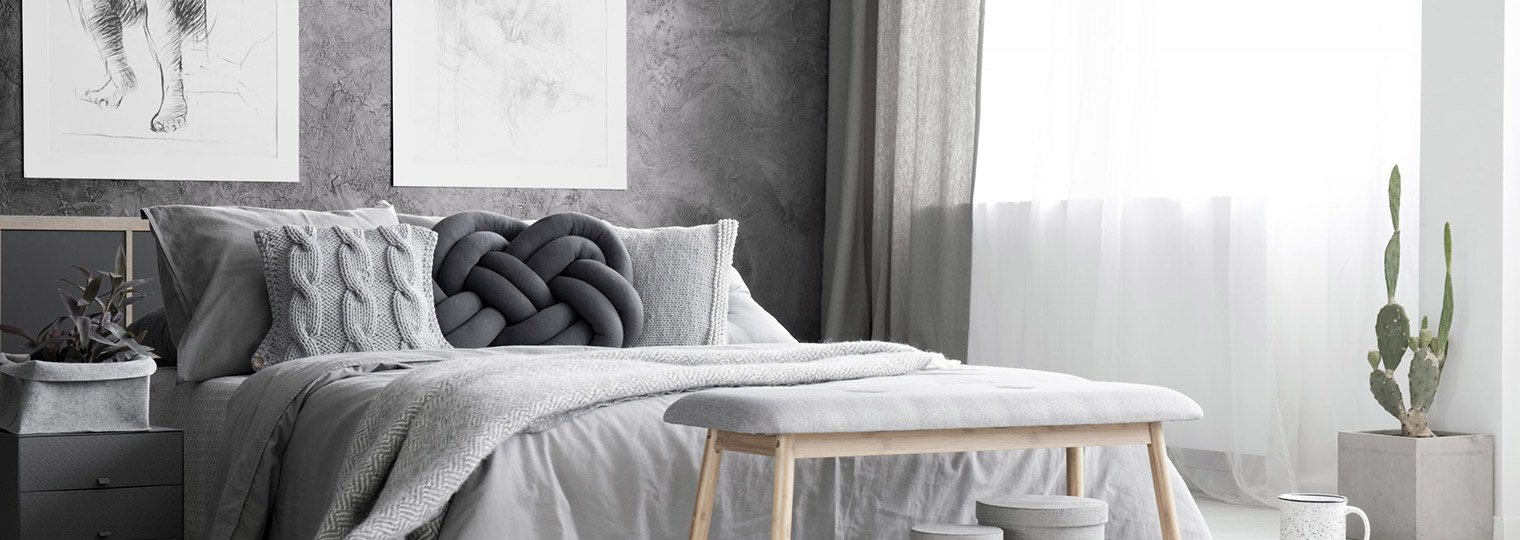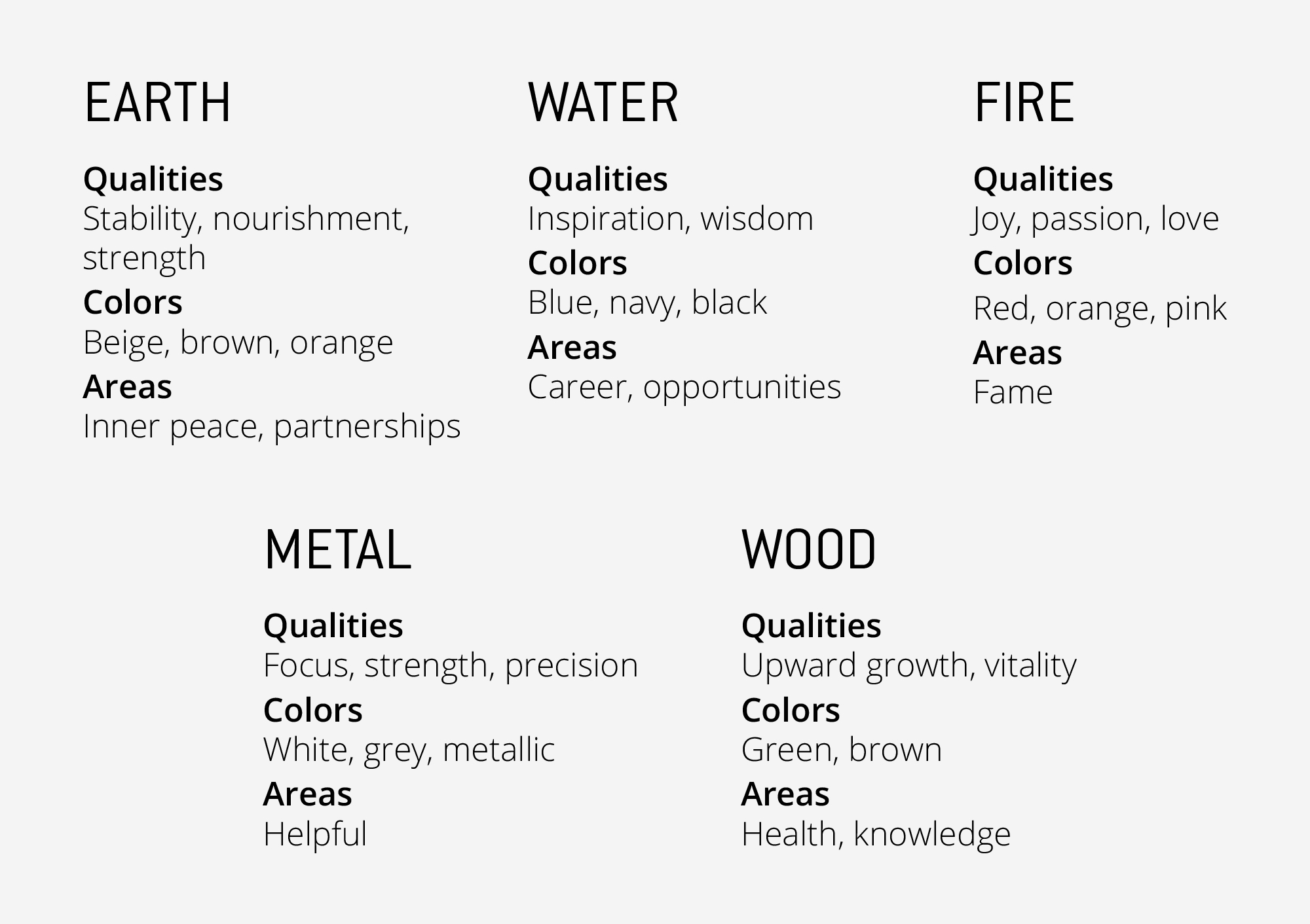

The Beginner’s Guide to Feng Shui

A home is more than the sum of its parts. It’s a place where you can feel safe, comforted, and at peace. A place where you can walk inside after a long day and feel immediately relaxed and at ease. More recently, it’s likely become a place where you can work productively during the day, and sleep soundly at night.
The way our homes are structured, decorated, and maintained can have a powerful effect on how we feel, sleep, and work. This concept is the primary belief behind Feng Shui, the 3,000+ year old, ancient Chinese practice that uses energy to harmonize an individual with their environment. Feng Shui has its roots in Taoism but spread in popularity throughout China and Asia, making its way around the world and finding popularity in North America. If you’re new to Feng Shui and looking to learn more, this is the article for you. In our beginners guide you will learn the meaning behind Feng Shui, the basic principles that guide this complex, ancient practice, and some introductory tips from Feng Shui realtor and Triplemint agent, Susan Chan, that will help you to transform your home.

What exactly is Feng Shui?
Feng shui (pronounced “Fung Shway”) is an ancient Chinese practice that focuses on the balance and harmonization of energy within one’s living space. Feng shui stems from the Taoist belief in Chi (also spelled Qi), which is believed to be the spiritual life force that runs through each individual. Chi is made up of opposing but complementary yin and yang elements. When translated into English, feng shui literally means wind and water.
Taoists believed that by balancing yin and yang, one can improve the flow of positive energy, or rather the positive chi, in their lives. Feng shui is the process in which one can balance and improve their flow of chi through the arrangement of furniture, decor, objects, buildings, and space in a purposeful way. By utilizing a few thoughtful and intentional feng shui principles as your guide, you can turn your home from stuffy and crowded into balanced and harmonized.
The Basic Principles of Feng Shui
Before we dig in, it’s important to note that feng shui is a complex and deeply layered art that can be interpreted and practiced in a multitude of ways. The principles mentioned in this blog post aren’t part of every school of Feng Shui, and can be interpreted in different ways. In this article, we discuss four essential principles of Feng Shui: yin and yang, the commanding position, the bagua, and the five elements.
Yin and Yang
A good feng shui home will have a balanced representation of both yin and yang energies. These two energies are complementary forces: yin is feminine, it is represented through darker colors, and the energy it produces is soft, passive, quiet, and diffused. Yang is representative of masculine energy, it is white, bright, powerful, energized, active, and warm.
Feng shui realtor and Triplemint agent Susan Chan recommends that the best way to balance these energies within your own home are for public rooms such as your living room and kitchen, family room, or work areas to have more yang energy, and private rooms like your bedroom and meditation room to be more yin.
The Bagua
Bagua is essentially a compass or an energy map. The bagua is a physical map that’s meant to be superimposed onto the floor plan of your home and used to understand how areas of your home correspond to various areas of life. It is divided into 8 areas (each area corresponds to an element) and oriented according to the compass direction of your front door.
For example, after deciding that you’d like to improve your partnership or marriage, the bagua can tell you that your living room – which, in this theoretical example, is located in the southwest corner of your home – is in need of more earth elements. (We’ll get into what constitutes an earth element in the next section).

While several schools of feng shui do use the bagua, not all do.
The Five Elements
Possibly the easiest way to feng shui a room is to consider the five elements: earth, metal, water, wood, and fire. These five elements stem from Taoist philosophy and represent the cycles of nature and how they work together. Every school of feng shui utilizes the five elements, and all materials in the world can be classified as one of these five elements. By mixing, combining, or removing them, you have a quick and simple way to improve the flow of positive chi in your home. It’s important to note that each element is associated with certain life areas, and can be used as a guide to enhance and balance your chi. Here we break down the meaning behind these five elements further.

The Commanding Position
A core principle of feng shui is called the command position. This translates to the spot in a room that allows for the best flow of energy. In feng shui, that position is diagonal from the door and furthest away from it. If your room doesn’t allow you to be diagonal from the door, it’s important that you can, at the very least, see the door. The key pieces of furniture to place in an auspicious, commanding position are your bed, desk, and stove because they represent important areas of your life – respectively, yourself, your career, and your wealth.
How to Feng Shui your Home
One of the most effective ways to feng shui your home is to place key pieces of furniture in your bedroom, living room, and kitchen in the command position. Susan Chan adds “when in command position, the occupants will not be surprised or disrupted, allowing them to feel grounded, focused, and healthy.”
Feng Shui Bedroom Tips
The bedroom is an important room to feng shui because it’s where you spend a considerable amount of time and also where you are most vulnerable. “Sleep is a vital ingredient to a healthy mind and body and feng shui can help create a sanctuary that allows your body to get the best sleep” Susan adds. When a bed (or sofa, or stove) is placed in the commanding position – diagonal from the door and furthest away – it reduces vulnerability because one can easily see anything that comes through the door, allowing you to feel more at ease, and get a good night’s sleep.
For those of us in smaller homes, placing your bed, sofa, or stove in the command position might not always be possible. Susan Chan is an agent in the NYC market and knows these types of situations well. Her solution? “If your small city apartment makes it tough to be in a true command position, simply ensure the bed is placed furthest back in the room and not in line with the door. If your bedroom is too small to reposition your bed, another trick is to hang a mirror so that you can see the door through the mirror. Just be sure that you don’t see yourself when lying in bed or you may be startled when you need to get up in the middle of the night.” Positioning the bed in such a way also means you are aware and open to opportunities that may be coming your way. Plus, with a clear line of sight, your body subconsciously becomes at ease, which leads to a more restful and peaceful sleep.
To further enforce the command position within your bedroom, there should be a strong backing behind your head, meaning the head of the bed should be against a solid headboard or wall, and ideally not placed under a window (which can cause chi to flow outside and disrupt the energy balance).
“Another simple yet effective way to circulate energy is to clear out the space underneath your bed” says Susan. “If you must use the space under your bed for storage, make sure the items are soft and delicate like linens or towels, and not hard or made of metal, such as power tools and exercise equipment since those can adversely affect your health” adds Susan.
In addition to placing the bed in command position, Susan offers a few more quick and easy feng shui bedroom tips:
- Utilize darker yin colors for the bedroom to allow for restful sleep
- Leave the TV and electronics outside of the bedroom
- Place a soft rug next to your bed so that you feel comforted when you step in/out of bed
- Use a calming scent like lavender before bed, either spritzed onto your pillow or diffused into the air, to calm your chi before sleep
- Place something you love, like a piece of art, or a collection of beautiful objects, in front of your bed so that you will feel inspired looking at it in the morning and at night
- Earth elements are particularly well suited to the bedroom. Include beige or taupe colored linens, pillows, and pottery to sleep more peacefully.
The front entryway is another important space to feng shui. “The front door is important because it’s where the flow of energy starts and how opportunities enter. To ensure good front door feng shui, your front hall should be predominantly yang. That means, it should be bright, open, clean, clearly visible, and the door can be easily opened at least 90 degrees.” Susan elaborates that when buying a home, the front door is often one of the first things clients notice about the house, and it is closely tied to the curb appeal of the property. Can friends, family, and delivery workers easily find your front door? If not, it might be time to clear out those plants, dirt, and clutter so that it’s more visible. When such a space is clean and active, it sets a positive tone for the remainder of the house experience.
Feng shui can be applied to any space that you spend time in, but we believe it works best in a home that you care for and love. At Triplemint, we understand the importance of having a safe and meaningful space that you can call home. If you haven’t yet found that sacred place, let us help. Get in touch and take the next step in your real estate journey.